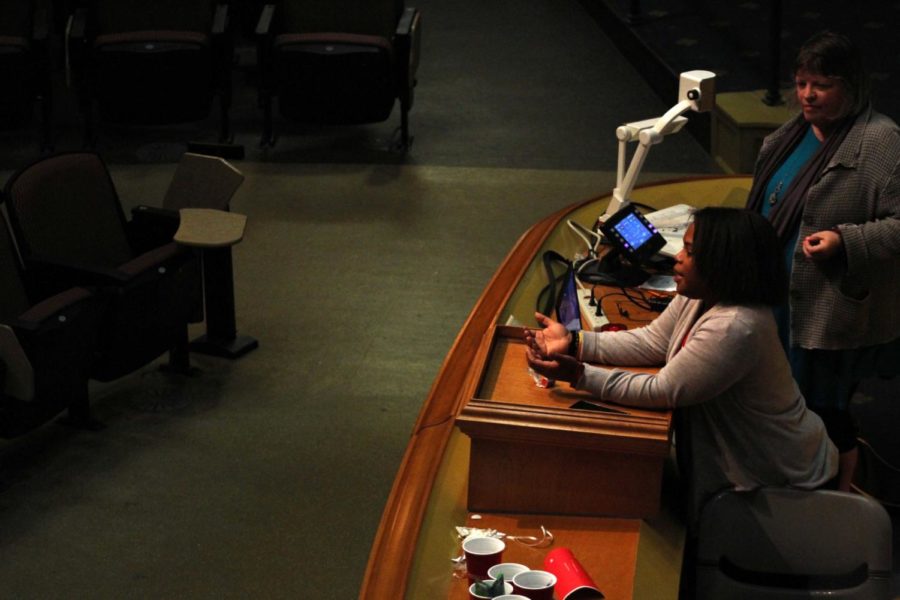GRL invites students to get serious about relationship dynamics
Hannah Olson / Iowa State Daily
Anasia Sturdivant, campus domestic abuse advocate speaks during Let’s Get Queerious event on intimate partner violence on April 12 in Curtiss Hall. The event was held as a part of Pride Week on campus.
April 12, 2017
One in 3 women and 1 in 4 men have been victims of physical violence by an intimate partner.
This statistic was one of many realities presented by Anasia Sturdivant, youth and campus domestic abuse advocate, and Lori Allen, campus sexual abuse advocate, as part of their presentation on intimate partner violence during “Let’s Get Queerious,” an informational overview of queer relationship dynamics.
“I’m here to talk about intimate partner violence and what that looks like in LGBT communities,” Sturdivant said. “It’s important to make sure everybody knows, especially young adults in college, what a healthy relationship looks like and be able to notice what an unhealthy one looks like.”
The event was hosted by Gamma Rho Lambda, an all-inclusive LGBTQIA+ and ally social sorority at Iowa State. Kenni Terrell, president of Gamma Rho Lambda, said the event was organized in light of April’s designation as Sexual Assault Awareness Month.
Sturdivant and Allen are advocates for the Assault Care Center Extending Shelter and Support (ACCESS) of Ames. ACCESS is a community organization that addresses issues pertaining to sexual and domestic abuse through advocacy and support for survivors.
“We’re trying to implement queer relationships and dynamics that are geared toward those relationships and bring them to the audience of the Ames and Iowa State communities,” Terrell said. “This event helps anyone from the spectrum to understand what we may face and how those dynamics fluctuate and change based on who we are as individuals.”
Sturdivant opened the presentation by explaining power and control dynamics within relationships. Power was defined as a situation when “an offender uses their actions intentionally with the purpose of gaining control over their partner.” She also stated that this pursuit of power often develops into a pattern that occurs throughout the entire relationship.
“Abuse can happen to anyone,” Sturdivant said.
The next slide explored the types of abuse and the most common progression of escalation of abuse within a relationship. According to the presentation, the progression started as verbal abuse. Verbal abuse would eventually escalate to emotional abuse, physical abuse and sexual abuse, in that succession.
“Verbal abuse can be people cussing each other out in a friendship,” Sturdivant said. “That can lead to emotional abuse. Emotional abuse can be defined as someone belittling you.”
Sturdivant continued by introducing a College Power and Control Wheel, an illustrated tool developed to identify ways in which an individual can experience an unhealthy or abusive relationship in college. A Power and Control Wheel representing issues specific to the LGBT+ community followed.
The wheel displayed issues that included HIV-related abuse, economic abuse, intimidation, stalking and isolation. Sturdivant and Allen would delve into each form of abuse throughout the presentation, offering several examples that they’ve come across in their advocacy.
“Some of the things we see is that in relationships, your partner might make a threat to hurt you, and they might carry that out,” Allen said. “These are really big red flags in relationships.”
Sturdivant and Allen also addressed issues pertaining to “gender norms” in society and how those norms can discourage individuals from expressing their identity.
“You don’t have to choose [an identity] and stay there,” Allen said. “Know yourself. Don’t be afraid to be curious about what you’re feeling. Its not an etched in stone declaration you have to make. ”
Allen added that “gender norms” create societal barriers. Sturdivant stressed that when one is confused about their identity, they should never hesitate to contact an older adult, or experienced individual within their community, for they may have gone through the same stress.
The advocates closed by offering advice on how to support survivors of intimate partner abuse. The advice was displayed in what was called the “BASER Model.”
BASER stands for Believe in what [the survivor] is telling you; Affirm that it is a good thing that they are telling you; Support them by reminding them that it is not their fault; Empower them by allowing them to make their own decision; Refer them to find additional support.
ACCESS offers a number of services, which include youth programs, counseling, support groups and community education. Its 24-hour crisis line can be found on its website. ACCESS can also be reached on Facebook, Instagram and Twitter.
















